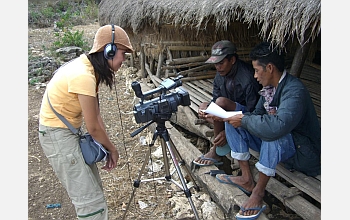News Release 07-180
Understanding How Humans Cause, Respond and Adapt to Change
NSF awards 26 new grants in studies of human and social dynamics

A researcher records language variation on the Indonesian island of Sumba.
November 28, 2007
This material is available primarily for archival purposes. Telephone numbers or other contact information may be out of date; please see current contact information at media contacts.
The only constant, it's said, is change. To further our understanding of how humans cause, respond and adapt to change, the National Science Foundation (NSF) has awarded 26 grants through its Human and Social Dynamics (HSD) Priority Area.
HSD aims to foster breakthroughs in understanding the dynamics of human action and development, as well as knowledge about organizational, cultural, and societal adaptation and change.
The HSD priority area is supported by NSF's Directorates for Social, Behavioral, and Economic Sciences; Biological Sciences; Computer and Information Science and Engineering; Geosciences; Mathematical and Physical Sciences; and Engineering and also by NSF's Offices for Polar Programs and International Research and Engineering.
"These projects represent not only a broad array of topics but also a broad range of collaborations," said David Lightfoot, NSF assistant director for social, behavioral and economic Sciences. "NSF's interdisciplinary programs are enabling scientists to identify and tackle problems that call for diverse analytical skills."
The HSD awards cover topics ranging from the diffusion and transmission of knowledge and ideas, to natural resource use and its impacts on human societies, to the neural interactions underlying human behavior.
"The new HSD awards continue to push the frontier of integrated approaches to addressing complex societal questions," said Rita Teutonico, advisor for integrative activities in the NSF directorate for social, behavioral, and economic sciences.
Examples of this year's HSD awards address such topics as:
Environmental impacts of shipping pallets, cell phone batteries, and water delivery systems
Christopher Ruebeck of Lafayette College in Pennsylvania plans to study the environmental impacts of three technologically and economically diverse markets: shipping pallets, cell phone batteries, and water delivery systems. His research team will create a model that combines economic incentives with environmental data, allowing for modeling of more complex systems.
By strengthening environmental analysis as a holistic decision-making tool, this project will improve decision-making in the three resource-intensive industries described above, thereby reducing wood, electronic device, and water waste. The computational models and methods developed will be applicable to many other industries with significant environmental impacts, such as packaging and personal computers.
Responding to natural disasters with computer-based decision support systems
Louise Comfort of the University of Pittsburgh will explore how communities can use decision support tools to quickly mobilize when exposed to risks. Recent natural disasters, both in the U.S. and abroad, demonstrate the need for rapid response. But mobilizing coordinated action across a diverse community is difficult even if that community has an existing disaster plan.
This team of researchers is exploring ways to integrate computer-based decision support systems into human decision-making. In their model, they account for separate (and often conflicting) decision processes at the individual, group, and organizational levels. Potential outcomes of this work include reduced loss of lives and property, and an increased ability to maintain operations during disasters.
Mathematical models to understand the genetic structure of human populations
Steve Lansing of the University of Arizona will gather genetic, linguistic, medical, demographic, and environmental data from villages in the Indonesian archipelago. The data will be used to build and test mathematical models to improve our understanding of the genetic structure of populations, the origins of language change, and genetic variation affecting susceptibility to diseases such as malaria, hepatitis, tuberculosis, and dengue.
Newly available tools are enabling these researchers to infer the effects of demographic processes on genetic patterns and language evolution. The project is being done in collaboration with Indonesian researchers at the Eijkman Institute for Molecular Biology and will provide education and training opportunities for students.
Moral judgments and how they break down with neural damage
Marc Hauser of Harvard University will study how humans evolved the capacity to make moral judgments, how such judgments change over development and across cultures, and how the capacity breaks down with neural damage. The project will measure the nature of moral decisions across different time periods (evolutionary, developmental, and cultural) and among different test populations (non-human animals, normal and neurobiologically impaired human infants and adults, and different cultures).
Results from this project will be useful in the areas of justice, public policy, education, and clinical treatment, shedding light on the biological and psychological mechanisms that humans bring to the moral table, and how we respond to policy that may be at odds with our intuitive moral sense.
Other projects in this year's HSD awards include studies of:
- Social, economic, and political aspects of U.S. ethanol policy (Duane Wegener, Purdue University)
- A multidisciplinary approach to communicating weather forecast uncertainty (Susan Joslyn, University of Washington)
- Salmon harvests in arctic communities (Elbert Howe, University of Alaska)
- Exploring the determinants of household environmental behavior (James Fraser, University of North Carolina at Chapel Hill)
- An agent-based approach to population-environment relationships in a marginal environment (Barbara Entwisle, University of North Carolina at Chapel Hill)
- Co-production of land use and livelihood change in rural African societies (Brent McCusker, West Virginia University)
- An analytic framework for political and social change (Daron Acemoglu, Massachusetts Institute of Technology)
- Understanding strategic economic interactions in monkeys, apes and humans (Sarah Brosnan, Georgia State University)
- Dynamics of idea generation in individual and group brainstorming (Vincent Brown, Hofstra University)
- Interactive deception and its detection through analysis of interviewer-interviewee dynamics (Judee Burgoon, University of Arizona)
- Modeling community response and economic impacts of risk following a terrorist strike (William Burns, Decision Science Research Institute)
- Issue adoption in human rights advocacy networks (Charli Carpenter, University of Pittsburgh)
- Visualizing culture-gene interactions in neural systems of emotion (Joan Chiao, Northwestern University)
- Dynamic patterning in conflict behavior between states and non-state actors (Mark Crescenzi, University of North Carolina at Chapel Hill)
- Context, experience, and market anomalies (Ali Hortacsu, University of Chicago)
- A multiscale framework for analyzing activity dynamics (James Hollan, University of California-San Diego)
- Solving critical problems in online groups (Robert Kraut, Carnegie-Mellon University)
- Modeling interactions between individual behavior networks and public policy to support public health epidemiology (Madhav Marathe, Virginia Polytechnic Institute and State University)
- The process of collective behavior (Richard Ruback, Pennsylvania State University)
- Combining statistical and economic metrics of prediction quality (Arthur Small, Pennsylvania State University)
- Intercultural knowledge system dynamics in complex services outsourcing (John Taylor, Columbia University)
- Scalable computational analysis of the diffusion of technological concepts (Ping Wang, University of Maryland College Park)
-NSF-
-
Chimpanzees will be tested on their knowledge of goals and interactions.
Credit and Larger Version -
A computer simulation will be used to understand how goods can be recycled more efficiently.
Credit and Larger Version
Media Contacts
Bobbie Mixon, NSF, (703) 292-8070, email: bmixon@nsf.gov
Cheryl Dybas, NSF, (703) 292-7734, email: cdybas@nsf.gov
The U.S. National Science Foundation propels the nation forward by advancing fundamental research in all fields of science and engineering. NSF supports research and people by providing facilities, instruments and funding to support their ingenuity and sustain the U.S. as a global leader in research and innovation. With a fiscal year 2023 budget of $9.5 billion, NSF funds reach all 50 states through grants to nearly 2,000 colleges, universities and institutions. Each year, NSF receives more than 40,000 competitive proposals and makes about 11,000 new awards. Those awards include support for cooperative research with industry, Arctic and Antarctic research and operations, and U.S. participation in international scientific efforts.
Connect with us online
NSF website: nsf.gov
NSF News: nsf.gov/news
For News Media: nsf.gov/news/newsroom
Statistics: nsf.gov/statistics/
Awards database: nsf.gov/awardsearch/
Follow us on social
Twitter: twitter.com/NSF
Facebook: facebook.com/US.NSF
Instagram: instagram.com/nsfgov


